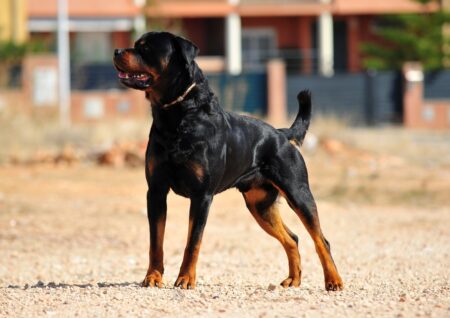Rottweiler: All You Need to Know About This Dog
Rottweilers are a popular breed of dog that is known for their strength, loyalty, and intelligence. They have been bred for centuries as working dogs, but they have also become beloved family pets. In this guide, we will provide you with all the essential information you need to know about this impressive breed.
Rottweiler: All You Need to Know About This Dog
Rottweilers, also known as “Rotties,” are large, powerful dogs with highly recognizable black and tan coats. Originally bred to herd and protect livestock, Rottweilers are now commonly used as guard dogs, police dogs, and family pets. Here’s everything you need to know about this loyal and devoted breed.
Appearance
Rottweilers are a large and muscular breed, typically weighing between 80-135 pounds and standing 22-27 inches tall at the shoulder. These dogs have a distinctive black and tan coat, with tan markings appearing on the face, chest, and legs. The coat is short, thick, and glossy, and may have a slightly wiry texture.
The head of a Rottweiler is broad and powerful, with a well-defined stop and a strong jaw. Their ears are typically cropped, though cropping is becoming less common in some countries. Their tails are usually docked, but again, this practice is becoming less common.
Temperament
Rottweilers are known for their courage, confidence, and loyalty. They may appear intimidating to strangers, but they are typically calm and reserved until provoked. With proper socialization and training, Rottweilers can make excellent family pets. They are devoted to their owners and are known to be protective of their families and property.
Rottweilers are typically good with children, but due to their size and strength, supervision is recommended. Early socialization is also crucial to help them become comfortable around other animals and people.
Training
Due to their strong and independent nature, Rottweilers require early and ongoing training to ensure they become well-mannered and well-behaved dogs. Positive reinforcement techniques are recommended, as Rottweilers respond well to praise and rewards.
It’s essential to establish yourself as the pack leader and consistently enforce rules and boundaries with a Rottweiler. This breed can become stubborn if they senses a lack of leadership, which can result in an uncontrollable and potentially dangerous dog.
Exercise
Rottweilers are high-energy dogs and require daily exercise to keep them physically and mentally stimulated. This can include walks, runs, playtime, and training sessions. Providing various activities will prevent them from becoming bored and acting out.
While Rottweilers can adapt to apartment living, they do best with a fenced-in yard where they can run and play freely. It’s essential to keep them on a leash when in public to prevent any potential aggression towards other dogs or people.
Grooming
Rottweilers have a short and dense coat, making them relatively low maintenance in terms of grooming. Weekly brushing and occasional baths are typically all that is required to keep their coat healthy and shiny. Like all dogs, they will need nail trims, dental care, and regular ear cleaning.
Potential Health Issues
Rottweilers, like all breeds, are susceptible to certain health problems. Some of the most common health concerns for this breed include:
- Hip and elbow dysplasia
- Cruciate ligament rupture
- Progressive retinal atrophy
- Entropion
- Mast cell tumors
- Bloat
Responsible breeders will screen their dogs for these health issues before breeding to reduce the risk of passing them on to puppies. It’s also essential to schedule regular check-ups with a veterinarian and to keep up-to-date with vaccinations and preventative care.
All in all, Rottweilers are a loyal and devoted breed that can make great companions for the right owner. With proper training, socialization, and exercise, these dogs can thrive in a variety of settings and make a great addition to any family.
Rottweiler History
The Rottweiler breed originated in the town of Rottweil, Germany where they were known as “Rottweil butchers’ dogs.” These dogs were used to drive cattle to market and also served as guard dogs for their handlers. It is believed that the Rottweiler’s ancestors were descended from Roman Molossian war dogs and were brought to Germany by the Roman army.
In the early 19th century, the Rottweiler’s popularity began to decline as railroads began to replace the need for cattle drives. However, the breed saw a resurgence in the early 20th century when they were recognized for their loyalty, intelligence, and protective instincts.
During World War I, the Rottweiler was widely used as a police and military dog. After the war, they became popular as police, guards, and search and rescue dogs all over the world. In the United States, the Rottweiler Club of America was founded in 1928 and the breed was officially recognized by the American Kennel Club in 1935.
Rottweiler Dog Price
The cost of a Rottweiler dog can vary greatly depending on factors such as breeder reputation, bloodline, location, and demand. On average, a Rottweiler can cost anywhere from $1,500 to $3,500. However, premium-bred and show-quality Rottweilers can cost upwards of $6,000.
Additional costs to consider when owning a Rottweiler include initial puppy expenses such as vaccinations, spaying/neutering, and supplies such as a crate, collar, and leash. Ongoing costs include food, grooming, training, and regular veterinary care.
It is important to not only consider the initial purchase price but also the long-term expenses of owning a Rottweiler before deciding to bring one into your home.
SEE ALSO: How Often Should You Walk Your Dog?
Rottweiler Temperament
The temperament of Rottweilers is often described as calm, confident, and courageous. They are known for their loyalty and protective nature towards their owners and family members. Rottweilers are also intelligent and energetic, making them great working and companion dogs. They are typically not aggressive by nature but will defend their loved ones if they feel threatened. Proper socialization and training are important for Rottweilers to develop into well-mannered and well-adjusted dogs. Overall, their temperament can vary depending on individual personality and training, but they are generally known to be loyal, confident, and protective dogs.
Rottweiler Size
The average size of a male Rottweiler is 26-27 inches (66-68 cm) in height and 95-135 pounds (43-61 kg) in weight. Females are typically slightly smaller, standing 23-25 inches (58-64 cm) tall and weighing 80-100 pounds (36-45 kg).
Common Health Problems in Rottweilers
- Hip and Elbow Dysplasia: Hip and elbow dysplasia is a genetic condition in which the hip and elbow joints do not properly develop, leading to pain, stiffness, and lameness. This condition is common in large breeds such as Rottweilers and can eventually lead to arthritis. Proper screening and breeding can help reduce the risk of hip and elbow dysplasia in Rottweilers.
- Gastric Dilatation-Volvulus (Bloat): Bloat, also known as gastric dilatation-volvulus (GDV), is a serious and potentially life-threatening condition in which the stomach fills with gas and twists on itself. This can cut off blood flow to the stomach and other organs, leading to shock and death. Rottweilers, along with other large and deep-chested breeds, are at a higher risk for developing bloat. Feeding multiple small meals throughout the day and avoiding vigorous exercise after eating can help prevent bloat.
- Aortic Stenosis: Aortic stenosis is a heart defect in which the aortic valve does not open properly, restricting blood flow from the heart to the rest of the body. Rottweilers are one of the breeds that are commonly affected by this condition, which can lead to heart failure if left untreated. Symptoms include difficulty breathing, weakness, and fainting. Regular check-ups with a veterinarian can help catch and manage aortic stenosis early on.
- Osteochondritis Dissecans (OCD): Osteochondritis dissecans is a joint disorder in which a small piece of cartilage and underlying bone breaks off from the joint surface. This can lead to pain, lameness, and joint swelling. Rottweilers, like other large breeds, are prone to this condition due to their rapid growth. Proper diet and exercise can help reduce the risk of OCD.
- Eye Problems: Rottweilers are prone to several eye conditions, including progressive retinal atrophy (PRA), cataracts, and entropion. PRA is a degenerative disease that can eventually lead to blindness, while cataracts and entropion can cause vision impairment or discomfort. Regular eye exams by a veterinarian can help catch and treat these conditions early on.
- Parvovirus Infection: Parvovirus is a highly contagious viral infection that can be fatal, especially in puppies. Rottweiler puppies are particularly at risk due to their immature immune systems. Symptoms include fever, vomiting, diarrhea, and lack of appetite. Vaccinations and avoiding contact with infected dogs can help prevent parvovirus infection.
- Canine Distemper: Canine distemper is a viral infection that can affect a dog’s respiratory, gastrointestinal, and nervous systems. It is highly contagious and can be fatal, especially in unvaccinated puppies. Symptoms may include fever, coughing, vomiting, diarrhea, and seizures. Vaccinations and avoiding contact with infected dogs can help prevent distemper.
- Osteosarcoma: Osteosarcoma is a type of bone cancer that commonly affects large and giant breeds, including Rottweilers. It typically affects the leg bones but can also occur in other bones. Symptoms may include lameness, swelling, and pain. Treatment options may include surgery, chemotherapy, and radiation therapy.
- Hypothyroidism: Hypothyroidism is a hormone disorder in which the thyroid gland does not produce enough thyroid hormone. This can lead to a wide range of symptoms, including weight gain, lethargy, skin problems, and intolerance to cold. Rottweilers are one of the breeds that are commonly affected by this condition.
Caring for Your Rottweiler
- Exercise regularly: Rottweilers are high-energy dogs and require daily exercise to stay healthy and happy. Make sure to take your Rottweiler for walks, runs, or playtime in a fenced area every day. This will not only keep them physically fit but also help burn off excess energy and prevent destructive behaviors.
- Provide a balanced diet: A Rottweiler’s diet should consist of high-quality dog food that is appropriate for their age, size, and activity level. Avoid giving them table scraps, which can lead to obesity and other health problems. Consult with your veterinarian to determine the best diet for your Rottweiler.
- Groom regularly: Rottweilers have a short, double coat that requires minimal grooming. Brushing them once or twice a week will help remove any loose hair and keep their coat looking shiny and healthy. They may also benefit from a bath every few months, but be careful not to overdo it as excessive bathing can strip their coat of its natural oils.
- Socialize and train early: It is important to socialize and train your Rottweiler from a young age to ensure they grow up to be well-behaved and well-adjusted dogs. Expose them to a variety of people, animals, and environments to help them become comfortable and confident in different situations. Enroll them in obedience classes to help them learn basic commands and good manners.
- Monitor for health issues: Rottweilers are prone to certain health issues such as hip dysplasia, eye problems, and bloat. Keep an eye on your Rottweiler’s overall health and watch for any signs of discomfort or illness. Make sure they receive regular check-ups and vaccinations from a veterinarian to maintain their health.
- Give them plenty of attention: Rottweilers are social and affectionate dogs that crave attention from their owners. Make sure to spend quality time with your Rottweiler, whether it’s going for walks, playing games, or just snuggling on the couch. Neglect can lead to behavioral issues in Rottweilers, so show them love and attention regularly.
- Maintain good hygiene: Keeping your Rottweiler’s teeth clean is important for their oral health. Brush their teeth regularly and provide appropriate dental chews to help prevent tartar build-up. Also, trim their nails regularly to keep them at a comfortable length and avoid potential injuries.
- Be a responsible owner: Rottweilers have a strong and protective nature, but their owners need to be in control of their behavior. Make sure to socialize and train them properly, and always supervise them when interacting with other dogs, children, and strangers. Also, be aware of your local laws and regulations regarding Rottweilers, as some areas may have restrictions on this breed.
Rottweiler Feeding
Make sure that your dog gets a balanced diet, with plenty of protein and the right amount of vitamins and minerals.
Raw Meaty Bones For Healthy Rottweilers. Feed your dog once or twice a day as recommended by your vet. Ensure that you provide fish oil supplements to promote healthy skin and coat. Keep in mind that you should not feed your Rottweiler cookies, chips, canned food, or other snacks.
FAQs
Q. What is a Rottweiler weakness?
A. Rottweiler is prone to optical disorders, including cataracts, entropion, and progressive retinal atrophy, as well as hip dysplasia and association orthopedic complaints.
Q. What is special about Rottweilers?
A. Special things about Rottweiler are that they are smart, tireless, and eager to please their owners.
Q. What does a Rottweiler need to survive?
A. A Rottweiler needs plenty of training and stimulation to survive.
Q. What is the attitude of a Rottweiler?
A. Rottweilers are calm and confident, courageous but not unduly aggressive.
Q. What breeds make a rottweiler?
A. Rottweilers are descendants of Roman drover dogs.
Q. Are rottweilers dangerous?
A. No, Rottweilers are not dangerous.
Q. Are rottweilers good with kids?
A. Rottweilers are one of the top dogs that people might recommend for families with children.
SEE ALSO: Can Cats Be Vegan?
Conclusion
In conclusion, Rottweilers are loyal, confident, and powerful dogs with a long history of working alongside humans. They have a strong and muscular build, with a distinctive black and tan coat. While they may have a reputation for being aggressive, proper training and socialization from a young age can help them become well-behaved and gentle companions.
Rottweilers require an experienced owner who can provide them with consistent training, plenty of exercise, and proper socialization. They thrive in homes with a yard and active families who can keep up with their energy levels. It’s also important to note that Rottweilers may not do well with other pets, so proper introductions and supervision are necessary.


